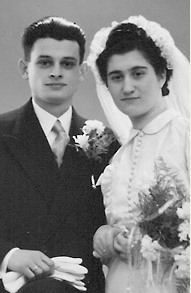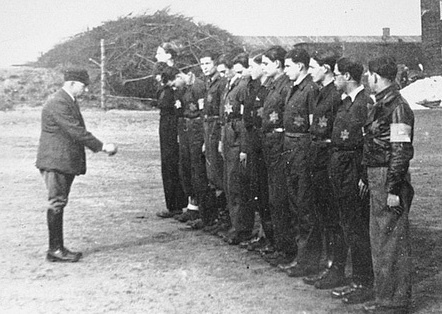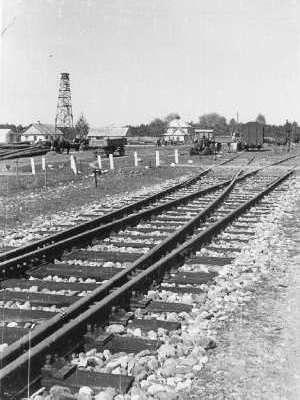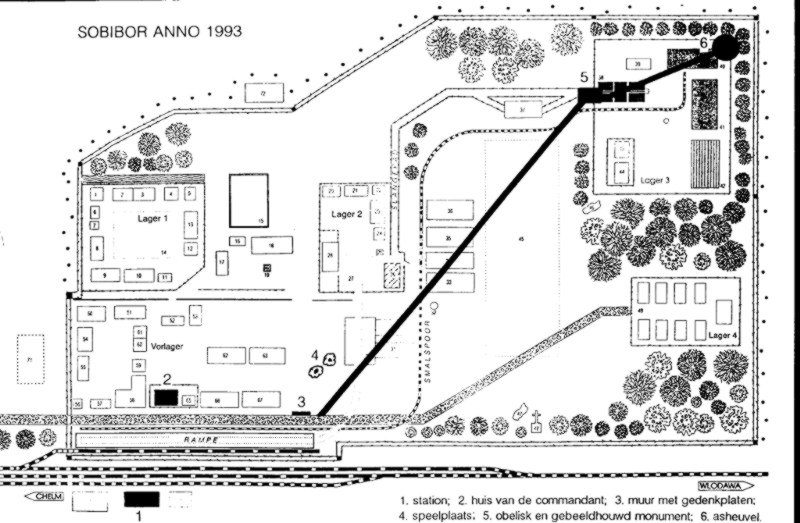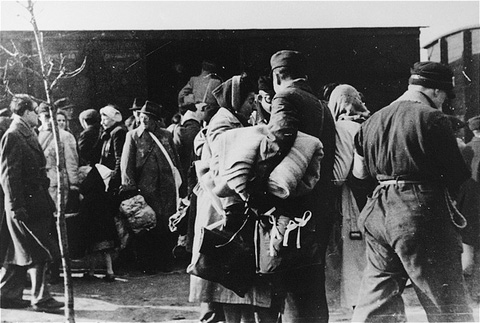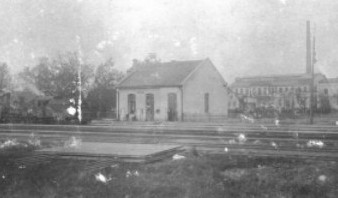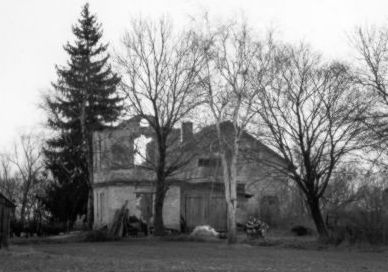Holocaust Education & Archive Research Team |
|
Survivor Stories
Holocaust Survivors Chelmno Survivors Righteous Gentiles Holocaust Recalled
| |||||
Jules Schelvis Recounts his Journey and Arrival at to Sobibor Death Camp
Jules Schelvis, his wife Rachel, whom he married on the 18 December 1941, were deported from Westerbork, transit camp in Holland to the Sobibor death camp in Poland on the 1st June 1943. Rachel’s family included as the head of the family, her father David Borzykowski who was born in Janow, Poland on the 13 February 1892 and the family home was at Nieuwe Kerkstraat 103, Amsterdam. Her mother Gitla was born in Czestochowa, Poland in 1895.
Other family members Chaja Stodel- Borzykowski who was born in Amsterdam 1921, Rachel Schelvs – Borzykowski, born on the 2 March 1923 and Herman Borzykowski who was born in Amsterdam in 1927. Only Jules Schelvis, survived, his wife and his wife’s family all were murdered in the gas chambers of Sobibor on the 4 June 1943, and he gave a detailed account of their journey and arrival in the death camp on that June day:
“The train, which departed from Westerbork on Tuesday 1 June, consisting of a long line of freight wagons, was carrying 3006 persons. There were sixty-two in my wagon, including my wife, and her family, plus one pram.
The journey took place under the most primitive conditions, lacking even basic provisions, such as straw to lie upon, or hooks to hang things from. Apart from two barrels, one filled with water, the others for our waste, the men from the Westerbork Orde Dienst (OD Order Service) had carried aboard a few bread parcels. The sick were wheeled towards the wagons on trolleys. And all of this ostensibly to send us to police-supervised labour camps in Germany, which is how it was put on all the relevant forms. The commandant and his helpers stood by, watching the operation’s progress.
I have no recollections of any officials, in their well-polished shiny boots, concerning themselves with us at all. We had been entrusted to the care of the Jewish Council. Once everyone had clambered aboard, the sliding doors were barred on the outside. With all our luggage, we were packed like a tin of sardines, wondering how long we could endure this. There was hardly any room to stretch one’s legs, and only one small, barred window, which was unglazed, to let some fresh air in.
We left around half past ten. Only then did we begin to realise that the journey was going to end in some mysterious place. Perhaps Auschwitz, we had heard about Auschwitz. What was certain, however, was that our stamina was going to be severely tested. The train stopped countless times en route in order to let regular and military transports pass.
Sometimes we stopped for hours on end for no discernable reason. Throughout the entire journey, the doors were never opened once. We had to relieve ourselves in the little barrel, which soon caused a foul and unbearable stench. Having depleted the water from our own water bottles by the very first evening, we were parched with thirst.
The journey lasted for three long agonizing days, filled with despair and bickering. We went right across Germany via Bremen, Wittenberge, Berlin and Breslau and into Poland. In the morning of Friday 4 June we finally stopped at Chelm, close to what had once been the Russian border.
The journey had made us so weary that we were no longer interested in where we would end up. Only one question remained how to get out of this foul –smelling overloaded cattle wagon, and get some fresh air into our lungs. That Friday morning at around ten, after a seventy- two hour journey, we finally stopped in the vicinity of a camp. It turned out to be Sobibor.
The Jews of the Banhofskommando were very heavy-handed getting us off the train onto the platform. They let on they were Jewish by speaking Yiddish, the language of the Eastern European Jews.
The SS men standing behind them were shouting “schneller, schneller,” faster –faster, and lashed out at people once they were lined up on the platform. Yet the first impression of the camp itself aroused no suspicion, because the barracks looked rather like little Tyrolean cottages, with their curtains and geraniums on the window sills.
But this was no time to dawdle. We made our way outside as quickly as possible. Rachel and I, and the rest of our family, fortunately had no difficulty in swiftly making our way onto the platform, which had been built up of sand and earth.
Behind us we could hear the agonised cries of those who could not get up quickly enough, as their legs had stiffened as a result of sitting in an awkward position for too long, severely affecting their circulation. But no one cared. One of the first things that occurred to me was how lucky we were to all be together, and that the secret of our destination would now finally be revealed. The events so far did not hold out much promise though, and we understood that this was only the beginning.
It was obvious we had arrived at our final destination: a place to work, as they had told us in Holland. A place where the many who had gone before us should now also be working. Our presence must be of quite some importance, why else would the Germans have bothered to bring us all the way here, travelling for three days and nights, covering a distance of two thousand kilometres?
Yet the Germans were using whips, lashing out at us and driving us on from behind. My father-in-law, walking beside me, was struck for no reason. He shrank back in pain only for a moment, not wanting anyone to see. Rachel and I firmly gripped each other’s hand, desperate not to get separated in this hellish situation. We were driven along a path lined with barbed wire towards some large barracks and dared not look round to see what was happening behind us.
We wondered what had happened to the baby in our wagon, and to the people unable to walk; and what about the sick and the handicapped? But we were given no time to dwell on these things, and, besides, we were too preoccupied with ourselves. “What shall I do with my gold watch?” Rachel said. “They will take it from me in a minute.” I replied, “Bury it, because it could be worth a lot of money later.”
As she was walking, she noticed a little hole in the sand, and quickly threw the watch down, using her foot to cover it up. “Remember,” she said, “where I’ve buried it. We can try digging it up later, when we have a little more time.”
Like cattle, we were herded through a shed that had doors on either side, both wide and open. We were ordered to throw down all our luggage and keep moving. Our bread and backpacks, with our name, date of birth and the word ‘Holland’ written on them, ended up on top of the huge piles, as did my guitar, which I had naively brought and carefully guarded all the way. Quickly glancing around, I saw how it ended up underneath more luggage. It dawned on me that there was worse to come. Robbed of everything we had once spent so much care and time in acquiring, we left the shed through the door opposite.
I was so taken aback and distracted by having had all our possessions taken from us, that although I had seen an SS man at some point, I never noticed, until it was too late, that the women had been sent in a different direction. Suddenly Rachel was no longer walking beside me. It happened so quickly that I had not even be able to kiss her or call out to her. Trying to look around to see if I could spot her somewhere, an SS man snapped at me to look straight ahead and to keep my “Maul (gob) shut.”
Along with the men around me, I was driven on at a slightly slower pace to a point just an opening in a fence, where yet another SS man was posted. He looked the younger men up and down fleetingly, seeming to have no interest in the older ones. With a quick nudge of his whip, he motioned some of them to line up separately by the edge of the field.
Directly in front of me, my brother-in-law Ab, was directed to join this growing group. My father-in-law, David and Herman, my thirteen year old brother-in –law, were completely ignored. My father-in-law was too old, Herman too young. Glancing at me for just a moment, he let me pass as well. He needed to select only eighty healthy looking men.
Those who had not been selected had to move along into the field and sit down. That Friday, 4 June 1943, the Sobibor sun beat down on our heads. It was midday and very hot already. There we were, defenceless, powerless, exhausted, at the mercy of the Germans, and completely isolated from the rest of the world. No one could help us out here. The SS held us captive and were free to do as they pleased.
The rows of men out on the field were getting bigger as those from the other wagons joined us. While we were waiting, I had a little time to collect my thoughts. Our harsh treatment seemed to be in conflict with the image of the Tyrolean cottage-like barracks with their bright little curtains and geraniums on the window sills. They had such a friendly and calming effect on me after all the tensions of the preceding days. The camp had seemed devoid of any other people, apart from the Germans and the Jews who had ‘welcomed’ us on the platform.
As I sat there, I noticed a few Dutch prisoners had approached from the other side of the barbed wire fence and were trying to make contact with us. I recognised Moos van Kleef, the owner of the fish shop on the corner of the Weesperstraat. My arms gestured a question; how are things here, what can we expect? To assuage us, he yelled out to us, “that it was all right here, no reason to be concerned.” I heard him say. “We have a job here, everything is new, or has to be built.”
My mind was ticking over faster. I thought this must be the new camp for which they will require some sort of order service (police). That must be why they need those young men. My intuition told me I would want to be part of that group. Not so much for the order service, but to be with my brother-in-law, whom I could still see in the distance.
The field had become quite crowded and I had already come to terms with the idea of working in the camp when I saw the same SS man approaching. With his hands behind his back he ambled past the rows of men quite smugly, seeming quite pleased with himself. As he came closer, I suddenly remembered the order service.
He had almost passed when I jumped up and put up my hand, I asked permission to ask him a question. Glancing back at me quite affably, he hesitated briefly and then nodded his approval. I requested, in my best German, to join the other group. He stared into the distance tapping his whip against his boot a few times. He turned around and asked; “How old are you?” I replied: “Twenty-two, Herr Offizier.” “Healthy?” “Jawohl, Herr Offizier.”
Not altogether disinterested, he searched me with his eyes for a moment, apparently lost in thought. Then nodding his head in the direction of the group he said “Na Los.” I quickly ran towards it. The young men, relieved at finally being able to release some of the tension built up over the past few days, were chatting to an almost amiable SS man there. To my joy, my best friend Leo de Vries was also among them.
The German looked surprise when I joined them, because he believed the eighty-strong group to be complete. A little incredulously he asked: “They sent you as well? So now we have eighty-one, one too many, because to my knowledge there should only be eighty.”
After standing around and exchanging thoughts for a while, we were cut off abruptly by the SS man, who suddenly in quite a different tone of voice, told us to shut up. He continued;
“My colleague has selected you to work at another camp not far from here. You will return to Sobibor every evening so you can meet and enjoy yourselves with your family and friends.”
Pointing towards the field, he carried on; “They are going to have a bath now. This is why the men have been separated from the women, because they obviously cannot bathe together. All the others who arrived today will stay here.” As he spoke, I also saw the SS man addressing the men out on the field, though I could not quite hear his exact words. Obviously they were being told to undress, because I saw them starting to take off their clothes.
By the time ‘our’ SS man had lined us up in rows of five, all those out on the field had already removed their shoes and vests. Urged on by his loud Eins –zwei- drei-vier cadence, he tried to get us to march smartly and in-step towards the camp exit. He could not imagine how miserable we were after being scrunched up for days inside the cattle wagons.
On our way to the train I must have passed the spot where Rachel had buried her watch. I could not remember it. But I thought I might remember again in a few hours time, when, on my return, I would be headed in the same direction as when we arrived. Two wagons and an engine stood ready for departure.
All traces of turmoil had been erased from the platform, as though it had never happened. The train arrived in Trawniki on the very same day, 4 June 1943.
The group had to walk the remaining five kilometres from there to Dorohucza.
Sources: Sobibor - A History of a Nazi Death Camp- Jules Schelvis, published by Berg, Oxford and New York 2007. Jules Schelvis (2001), Sobibor. Transportlijsten. Amsterdam: Bataafsche Leeuw. ISBN 90 6707 516 7 Holocaust Historical Society
Copyright Victor Smart H.E.A.R.T 2009
|
